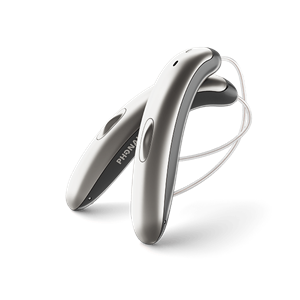Looking after and cleaning your hearing aid
Regular care and maintenance of your hearing aid is essential to prolong the life of your hearing aid. Read our tips below.
What should I be aware of when looking after my hearing aid?
Modern hearing aids are small and discreet, but they house powerful, modern technology. They must be looked after carefully to protect them from external influences.
A few general tips are provided here:
- Always have a soft cloth underneath when cleaning the hearing aid, changing the battery, or inserting and removing the hearing aid. This will prevent damage if you accidentally drop the hearing aid. A cloth of a plain color will also make it easier to find small parts quickly.
- Hearing aids are not generally waterproof and should therefore not be worn while swimming, showering, or in the sauna.
- Before inserting your hearing aid, make sure your ears are quite dry.
- If you wear a hat to protect your ears from the cold, you’ll be protecting your hearing aid at the same time.
- Hearing aids should be removed if you have an X-ray, MRI, or CT scan.
- Make sure you don’t get cosmetic products such as make-up or hairspray into your hearing aids. It’s a good idea to insert your hearing aid only after applying make-up or hairspray.
Find out below how to clean, dry, and store your hearing aid to ensure that you can enjoy your hearing aid for a long time.
Cleaning your hearing aid
As the microphone inputs can be blocked by sweat, and the volume control can be obstructed by earwax, it’s important to clean your hearing aid every day and to keep your ears free of earwax. You can easily do the regular cleaning yourself. Your Connect Hearing care professional can provide complimentary professional clean and checks to help prolong the life of your hearing aid and ensure it is in good working order. Everyday cleaning is also need to keep your hearing aids in good maintenance. See below for some tips on the best way to clean your in-the-ear hearing aid or behind-the-ear hearing aid on a daily basis.
How to clean your hearing aids
Watch these step by step instructional videos on how to clean your hearing aids for hands on examples of cleaning your RIC or custom hearing aids and hearing aids with earmolds.
Further tips for hearing aid cleaning:
- Ideally, you should inspect your hearing aid every day for visible soiling and wipe it off carefully using a soft, slightly damp cloth.
- Never use alcohol or other aggressive cleaning agents or solvents, as you risk damaging the electronic parts.
- Never use pointed objects, such as scissors or needles, for cleaning. Use only specially designed cleaning brushes.
- While cleaning your hearing aid, make sure your hands are clean and dry.
Drying and storing your hearing aid
Once you’ve cleaned your hearing aid, dry everything well before putting it back together. Moisture can cause damage and malfunctions, and can shorten the service life of your hearing aid. If your hearing aid does get wet, never dry it using a hairdryer, heater, microwave, or similar device, as high heat can soften and distort the plastic parts and damage the internal technology.
For gentle drying, use a specially designed air blower, drying box, or drying pouch. These are available from your local hearing clinic. In general, we recommend storing your hearing aid in a drying box overnight, which dries the hearing aid electrically and ensures improved cleaning thanks to UV light. Ensure that the battery compartment is open and that the hearing aid battery has been removed.
Another way to dry your hearing aid is to use a drying pouch or drying cup. These use silica gel to absorb moisture.
Because hearing aids are very sensitive to moisture, radiation and heat, they should always be stored in a clean, dry place. Don’t put them down in the kitchen or bathroom, or near a source of heat. A dedicated place, out of the reach of children and pets, will make it easier for you to find your hearing aid when you need it.
Replacing standard and rechargeable batteries
Modern hearing aid technology can only function correctly with the right batteries. Only specially designed hearing aid batteries should be used.
How long a battery lasts depends on the device, the length of time it is worn, and the size of the battery. Most batteries need changing every one or two weeks. This means it’s useful always to have a sufficient supply of spare batteries and to think about taking replacement batteries with you on longer trips. Batteries should be stored in a cool, dry place.
Alternatively, there are now hearing aids available that use rechargeable rather than standard, disposable batteries. Once charged, they provide up to 24 hours of listening enjoyment.
Warning: Take care not to mix up the left and right hearing aids. Each one is adapted to your individual hearing performance. In general, hearing aids are color coded to help you tell them apart (right is red, left is blue). If your existing hearing aid does not have this color coding, your audiologist can add it.
Our hearing care professionals are happy to give you advice about looking after your hearing aid, and can also provide professional maintenance. If you follow their tips, there's nothing to stop you experiencing the joys of hearing for years to come.
VAC, WCB, WSIB, WorkSafeBC, ADP & ODSP accepted. *Hearing evaluations/tests are free for customers over the age of 18. Fees may apply where specific testing for employment purposes, reports, a copy of your results or the completion of an application is required. See clinic for full details.



